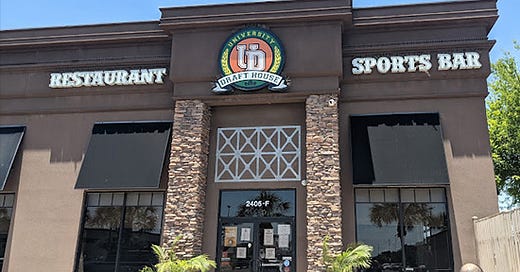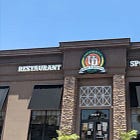University Draft House Retaliates Against Server
Waiter fired for allegedly requesting cash tips, instead of credit card tips, to avoid “tip share” extraction.
Author’s Note: This is Part I of a series exposing how University Draft House in Edinburg, merely one link in a wider business chain throughout the Rio Grande Valley, exploits their workers and treats them like disposable commodities. Read Part II here.
Editor’s Note: Article has been updated since first publishing to add clarity and context. — 21 June 2025
A server was fired June 19th from University Draft House in Edinburg for allegedly telling customers to preferably tip in cash because large portions of credit card tips are extracted at the end of the night to pay bartenders and bussers. The ex-server was also told that he was allegedly encouraging other servers to do likewise.
The server, who had been working for only three weeks and receiving rave reviews from customers, began noticing that he was getting paid the same amount at the end of the night regardless of how many “tips” were paid on credit card receipts. Talking to coworkers about this, the servers realized they were all getting paid the same amount—around $50 a night—regardless of tip amounts.
The servers realized that what the bosses were doing was paying them up to $7.25/hour (with tips) and taking the rest to pay bartenders and bussers. Management never explained what percentage is taken out. Servers were getting $40-$50 removed from credit card tips every day.
The idea is that it’s better for the company’s bottom-line if servers’ tips subsidize the wages of bartenders and others. This is a common and widespread—though varying to different degrees—practice in the restaurant industry.
The sever was initially reprimanded at the beginning of his shift for talking to coworkers about how tips are extracted from servers by management. Restaurant managers nationwide came up with a gimmick called ‘tip sharing,’ where servers are forced to surrender large portions of their credit card tips to subsidize the wages of bartenders and bussers. Managers justify the system by saying bartenders ‘make the drinks we sell’ and bussers clean our tables, but notice how this logic doesn’t apply to cooks whom you could say ‘make the food we serve.’
What’s really at play here is restaurant bosses pitting workers against one another in order to increase their own bottom lines.
In the audio recording up ahead of that first reprimanding at the beginning of the shift, the manager—Steven Salinas—is heard saying that bartenders will get mad if servers don’t “tip out”. Management intentionally pits severs against bartenders to keep them divided so that they don’t organize together against their common enemy. Listen to audio:
After working an entire shift, which included doing lots of manual labor after the restaurant closed to prepare for the next morning, the server was abruptly told by Steven Salinas, “Tonight’s your last night with University Draft House.”
Salinas went on to allege that employees and customers told him that the server was requesting cash tips because of the reason discussed, including the allegation that the company was stealing from servers. Throughout the course of this second and final reprimanding, Salinas also called the server a smartass and “playing with semantics,” becoming more and more hostile as the lashing continued.
The firing is likely illegal, as the server was engaged in free speech in talking with customers and coworkers about conditions at work, and he plans to file a complaint with the National Labor Relations Board.
Salinas told the server that if he had further complaints that he could “refer” him “to ownership.” The server asked who are the owners, but Salinas didn’t say. He instead called the server a “smartass” once more and said the server could send an email to universitydrafthouse@gmail.com which he would “forward” to the owners. University Draft House is owned by the same people who own Santa Fe Steakhouse and Republic of the Rio Grande Steakhouse. They are Albert and Sony Rego, as well as the aptly named, Fred Harms.
Related Coverage:





